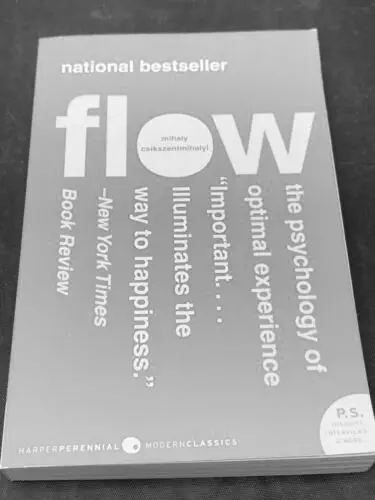Flow
The Psychology of Optimal Experience

Mihaly Csikszentmihalyi was a Hungarian-American psychologist and is often called “the father of Flow”. The feeling of flow arises when we are engaged in a meaningful and challenging task.There is an inherent desire in all of us to challenge ourselves with our own abilities, and we all want to experience the euphoria that flow can give. This works only the first time, so repeating something won’t bring the same euphoria, so the challenge must constantly be raised to create the same euphoria. In this way, we are driven to explore new ideas and learn new things.
The components of flow are:
- Engaging in an activity that is both challenging and achievable. We get bored if the activity is too easy; we get anxious if it is too difficult.
- The ability to remain focused on the task at hand.
- Clearly defined goals that are within one’s control. “Winning the Pulitzer Prize” is not a self-contained goal, for example, because you personally do not choose who wins the Pulitzer."
- Immediate feedback. It is very easy for our psychic energy to diminish without some confirmation that we’re on the right track.
- Being completely absorbed in the activity - removing all worries and frustrations from one’s awareness. Because so much of your psychic energy is engaged during flow, you “get lost” in what you are doing.
- Sense of control over your own actions.
- Non-self-conscious individualism. The author states that “loss of self-consciousness does not involve a loss of the self, and certainly not a loss of consciousness, but rather, only a loss of consciousness OF the self.” I have to agree. In my experience as a statistician, my worst presentations are always those where I am self-conscious.
- Some alteration of time. A feeling that “hours feel like minutes” or vice versa.
This is how a poet describes flow:
It’s like opening a door that’s floating in the middle of nowhere and all you have to do is go and turn the handle and open it and let yourself sink into it. You can’t particularly force yourself through it. You just have to float. If there’s any gravitational pull, it’s from the outside world trying to keep you back from the door.
I found this book very intriguing. Specifically, it made me think about what it means to be satisfied and happy. While the title and cover would suggest otherwise, this is not a self-help book. My interest in this book was sparked after I heard about Csikszentmihalyi’s work through some podcasts that I have been listening to. I was definitely not disappointed.